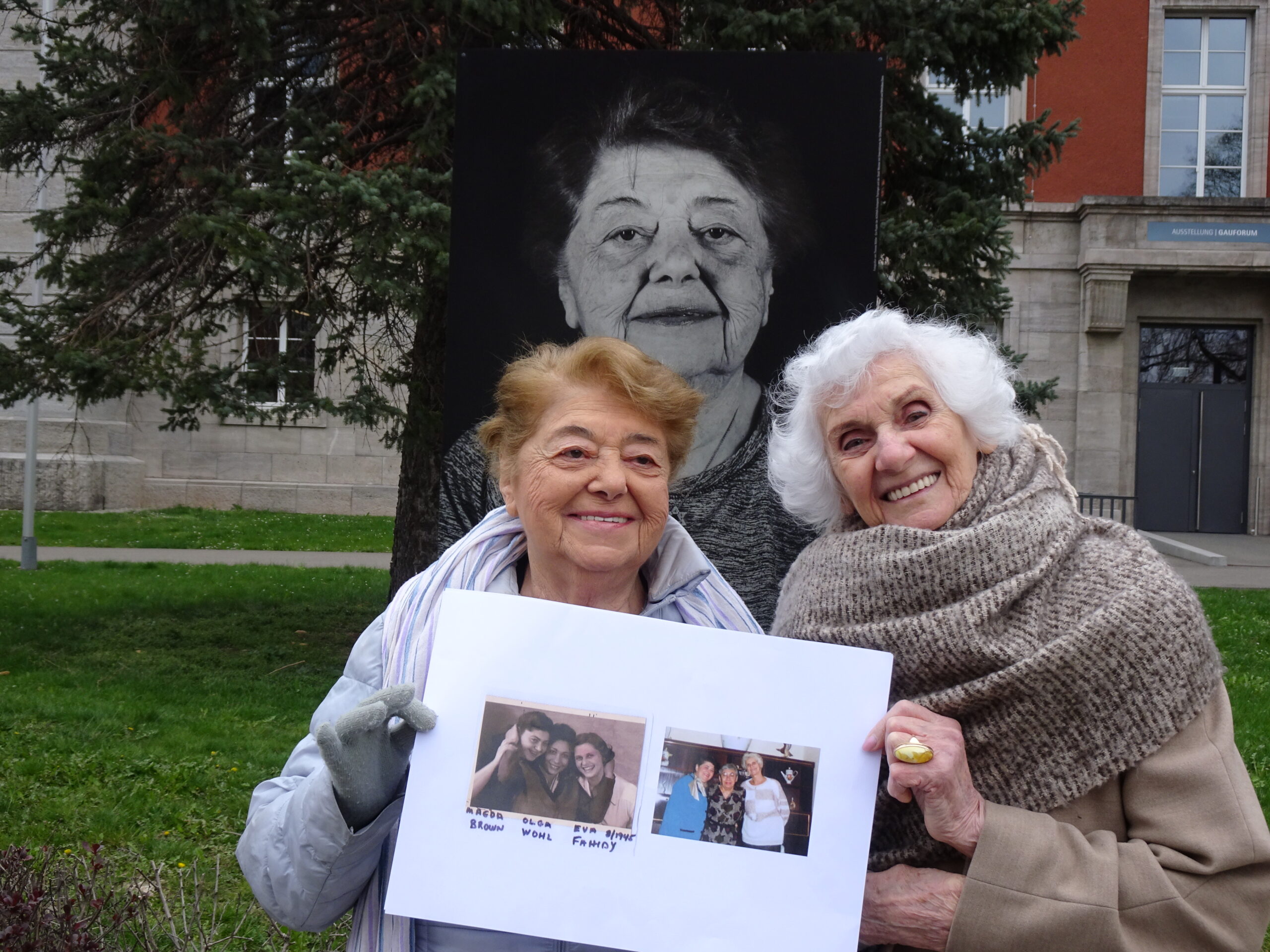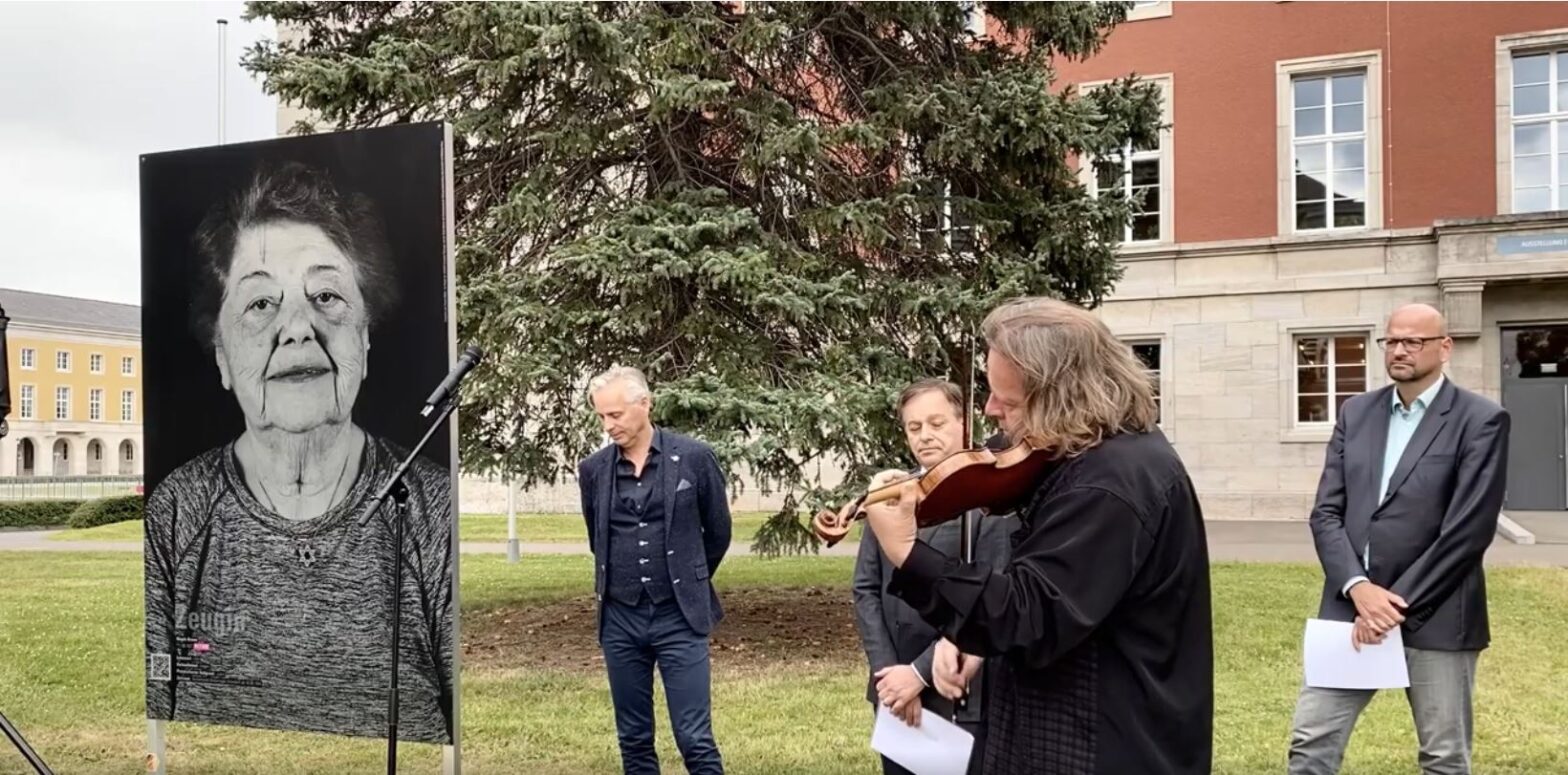Shortly after she passed away, Magda Brown was honored with a beautiful memorial service in Weimar, Germany. Magda – who was enslaved at a munitions factory at Allendorf, a sub-camp of Buchenwald after she was imprisoned at Auschwitz – visited Weimar in 2018 and 2019 for celebrations marking the anniversary of the liberation of the Buchenwald.
During the hour of remembrance, the US Consul General Dick Custim, who traveled to Weimar for the event, praised Magda as a courageous and tough fighter against anti-Semitism. Weimar Mayor Ralf Kirsten made it clear to those present that we must NEVER forget. The state rabbi of Thuringia, Alexander Nachama, sang a prayer for Magda Brown and led the group in a moment of silence. Gernot Suessmuth, 1st concertmaster of the Staatskapelle Weimar Orchestra, performed a piece in Magda’s honor. The memorial service also included Rikola-Gunnar Lüttgenau, Head of Public Relations at the Buchenwald Memorial Foundation; and Martin Kranz, Director of the ACHAVA Festival Thuringia; and the reading of a touching letter from Magda’s close friend Eva Fahidi Pusztai.
The service was held in front of Magda’s portrait. Taken by Weimar photographer Thomas Müller, large portraits of survivors of Buchenwald line the city center in Weimar. This permanent exhibition, DIE ZEUGEN, aims to keep history alive to prevent atrocities like the Holocaust from ever happening again.
Watch the memorial and read on for a transcript.
Introduction by Martin Kranz, Director of the ACHAVA Festival Thuringia
It is wonderful to see so many people who came to join us for this event to commemorate Magda Brown, who many of you knew very well.
Magda was born on June 11, 1927 in Hungary. She died only a couple of days ago on July 7 in Chicago. The picture we are seeing here was taken in 2018, when Magda came in for the memorial services of Buchenwald.
I would like to introduce those who came today to say a few words in honor of Magda Brown: the General Consulate of the U.S. in Germany, Dick Custim, who has come here from Leipzig spontaneously; Rikola Lüttgenau from the Buchenwald and Mittelbau-Dora Memorials Foundation; the Mayor of Weimar; as well as the Rabbi of Thuringia. Together, we would like to commemorate Magda Brown and listen to music by the concertmaster of the Weimar Orchestra Gernot Suessmuth.
From here to the Weimar central station, we show 22 portraits of Holocaust survivors. Whenever one of these survivors passes away, we plan to honor and commemorate them.
Dick Custim, Acting Consul General of the USA
Greetings. Thank you for giving me the opportunity to honor Magda Brown tonight.
We were in touch with Magda and her family in April. We approached her for a video interview for a virtual remembrance project for the 75th anniversary of the end of World War II.
At the consulate and as the representation of the U.S. in middle Germany, we were thinking about how we could celebrate and commemorate this special day. It didn’t take long to find out that there was no better ambassador for this occasion than Magda Brown, so we reached out to her and asked her for a video message (given Covid-19, it had be done digitally). It was such a great honor for us when she took the time to commemorate the liberation of Europe from the Nazis, lending her powerful voice as a survivor.
We will remember Magda Brown’s kindness, compassion, and, as we Americans say, her toughness.
In 2018, when a gunman killed 11 people at Pittsburgh’s Tree of Life Synagogue, Magda Brown didn’t hesitate to stand up against hate and bigotry. At the time of this antisemitic attack, she was already on her way to Pittsburgh, where she was scheduled to speak. When she was informed about what happened in Pittsburgh, still at the gate at the airport, she said, “Now, the world needs to hear the message even more. Let’s go.”
We will always make sure that Magda’s voice is still heard. So, I would like to quote Magda now: “My job is it to tell all the deniers that the Holocaust happened. I’m the proof that it was very real.”
Weimar Mayor Ralf Kirsten
Human dignity shall be inviolable. (Article 1 of the German constitution.) There was a time in this country when Germans believed that not everyone’s dignity was inviolable. They excluded, humiliated, and murdered people. Because these people were Jews, dissidents, or because these people were not members of the so-called German “master race.”
Germans also tried to take away Magda Brown’s dignity. They did not want Magda Brown to become 93 years old. The Nazis wanted her to die back then, when she was 17.
I remember a conversation with another survivor back in the year 2000. When he visited Weimar, he was very delighted to stay at the prestigious Hotel Elephant. It also used to be one of Hitler’s favorite hotels. This survivor always mentioned that Hitler had been dead for a long time, while he was still enjoying his stays at the hotel.
The people we are remembering with the help of these photos are the living proof of the existence of the Holocaust.
Of course, as time progresses, more and more survivors will pass away. That is why it is so important that we remind others of their stories. We must not forget what happened. We must be cautious, even more today. The ideology, the hate, the danger has not disappeared, and we must be vigilant. We must learn from their stories. We must not forget.
That is why it is so important that this project exists and that we are working with such a good photographer who took these portraits. I am very grateful for his work.
I hope that we, the people who oppose the ideology of hate, are strong enough to prevent history from repeating itself. Magda Brown’s legacy is our responsibility.
Reading of letter from Magda’s dear friend Eva Fahidi Pusztai

Magda Brown was deported from Hungary to Auschwitz on her 17th birthday. In August 1944, she was transferred to Allendorf in Hesse, a subcamp of the Buchenwald concentration camp.
There she became friends with Eva Pusztai Fahidi, who recently became an honorary citizen of the city of Weimar. Magda and Eva were liberated by U.S. troops in April 1945 and became close friends after liberation, residing in the same displaced persons camp. They were reunited in the 1990s during a trip to Hungary.
Eva wrote a letter to share some words about her friend and comrade Magda:
Dear Martin, dear friends,
The friendships we survivors developed over the years are much more than ordinary friendships. Those friendships started in the shadow of death. In Auschwitz-Birkenau, death was everywhere and one couldn’t escape it. We asked ourselves constantly: Where are our loved ones? Who from our families are still alive?
The rows of five – as we had to stand for the appeal – became a kind of replacement family. We supported each other and helped each other. In this time, Magda Perlstein played a big role in my life. Being with her, one could always find comfort and hope.
She was a well-behaved kid, and she talked about her parents a lot. She talked about her father who was butcher and had his own business, about her mum who helped him, she even talked about the customers of his shop. She talked about the beautiful family life they had, how she and her older brother, Miklos, grew up.
When Magda arrived in Birkenau, her father and mother soon disappeared. She was alone, standing naked between other women, not knowing what was happening and where to go. She only heard guards calling “Go! Go!” and did not understand the purpose.
Magda was lucky that she was considered “worth for work.” She was sent with 1,000 other women to Münchmühle. This is where I met her. Magda had to fill the bombs in Münchmühle.
Magda and I became very close friends after liberation. We lived together in Ziegenheim at the Kur family. Also, family Gärtner helped us a lot. When Magda heard that her brother had returned to Hungary, she also returned. That was in November 1945.
I can’t remember how Magda and Miklos came to the U.S, but I know that Magda got married in the U.S. to a very good husband. I also I still remember how one day – all of a sudden – Magda and her brother returned to Budapest. I felt like my sister had returned. Magda returned every year to Budapest. Whenever she came, it felt like the holidays!
Interestingly, Magda found the same way to address her trauma and to find peace as I did: She started speaking. With the same words I use, Magda described her life when she spoke. Through speaking, she dedicated her rich and successful life to confront antisemitisms, hate, and racism. She worked for a more just world for the youth. The young students she encountered said: “One hour with Magda means more than a full history book.”
I mourn for Magda like I mourned for my own sister – the best comrade and most loyal human being I have ever known. Her memory is our blessing. I am proud that I can call myself her friend.
Yours,
Eva Fahidi Pusztai
Budapest, Hungary
July 10, 2020
